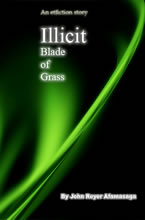Illicit Blade of Grass
John Reyer Afamasaga
ET Fiction (2007)
ISBN: 9780980348637
Because of the novels’ intertextuality, it is difficult to give a plot description solely for “Illicit Blade of Grass.” The book has a definite plot, but readers of Afamasaga’s other novels will find that it weaves in and out with those other works. Basically, the story centers on Metofeaz, a writer, and Rozelle, a ghost haunting the French villa where he stays. Rozelle Zofen was a singer who waited in vain all her life for a poet she heard recite the poem “Illicit Blade of Grass” during a party at the villa sometime around World War II. Metofeaz meets the Tourist, who needs a place to stay, and he allows her to live at the villa with him. When Metofeaz returns to the United States, the Tourist remains at the villa, making it her home and taking on Rozelle’s identity until they are one and the same. Later, the Tourist follows Metofeaz to New York. Metofeaz is by then an author, specifically, the author of “John Lazoo” (another book in this series—hence, the intertextuality). Metofeaz is now determined to make the most of his literary fame, which leads to additional complications.
The plot has more twists and turns and several other characters, but this summary is enough for the reader to get the gist of the story as he or she reads it. Afamasaga is determined to make his reader pay attention, both from lack of descriptive details to smooth over scene shifts, and by the confusion between the characters and the authors of the various books. Afamasaga writes himself into the book so that the reader wonders whether Afamasaga is himself real or fictional, or to what extent he is taking on a fictional persona when he is interacting in the novel with his fictional creations. He has achieved splendidly his goal to blur the line between reality and fiction.
I strain for words to define Afamasaga’s writing style. It is polished and clever, and while at first elusively appearing pasted together by an amateur, it is a professional weaving together of characters, fiction and reality. The style is minimalist—lacking in extensive description so that the reader must pay attention to the author’s quick pace. The book’s genre is difficult to define—Afamasaga himself, in a recent interview, remarked that he believes his books will be classified as fantasy, but he called his craft Emotional-Techno Fiction (etfiction). The author wants his reader’s experience to be that of falling in love and experiencing “the range of feelings one has when they fall in love” (see Afamasaga’s interview with Superior Book Productions). The patterns of techno music and the influence of technology upon our lives have also influenced his work.
Perhaps, these novels are fantasy or Emotional-Techno Fiction, but they are closely aligned with the modern and postmodern movements. I am reminded of the clever games of James Joyce, the tone of Andre Gide in “The Counterfeiters,” and Nabokov’s blending of fiction and reality in “Pale Fire.” And strangely enough, this intensely modern novella also calls to mind Homer and his epics and the poet of “Beowulf.” The intertextuality between Afamasaga’s novels makes the reader feel he is only reading fragments of an otherwise lost masterpiece. “Illicit Blade of Grass” is only a fragment of a larger work, most of which is still in the author’s brain, waiting to be discovered, to be dug out and put onto paper for readers. Unlock the lost lines of “Beowulf,” we have hope that the rest of the Afamasaga opus will be transcribed and preserved. In total, Afamasaga intends to write ten novels in this interconnected series. I advise the reader to visit his website www.etfiction.com and look at both the Timeline section where he gives an overview of the historical events in his characters’ lives, and the Development section that describes the future novels and where they fit into this amalgamation of character relationships.
John Reyer Afamasaga himself is as much a mystery as his books, for he has purposely blended himself into the fiction of his works. He lives in Australia. What little more can be known of him—if anything—one must try to piece together from his novels. He is like the “mute inglorious Milton” the Homer we can only know through his writings. In short, the author is much like his characters in his inability to be defined by fiction or reality, like his fictional alter-ego Metofeaz, whose writing is described thus in “Illicit Blade of Grass”:
His characters push open the lids of their coffins and push up the dirt that covers their doorways, not withstanding time’s rules and skin’s aging. Their voices race, and then they raise doubts about the here and now; are they there and then? Or, are they everywhere?
To explore the fictional puzzling world of John Reyer Afamasaga, you need only visit his website www.etfiction.com and download for free “Illicit Blade of Grass.” Visit now before the secret of Afamasaga’s novels becomes material reality and his books come with a price.
Read also an interview with John Reyer Afamasaga here at Superior Book Productions.
- Tyler R. Tichelaar, Ph.D. and author of “The Marquette Trilogy.”


